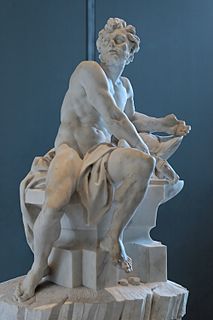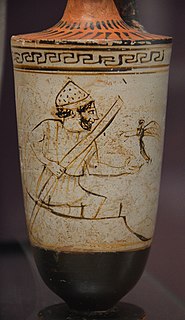
Hephaestus is the Greek god of blacksmiths, metalworking, carpenters, craftsmen, artisans, sculptors, metallurgy, fire, and volcanoes. Hephaestus' Roman equivalent is Vulcan. In Greek mythology, Hephaestus was either the son of Zeus and Hera or he was Hera's parthenogenous child. He was cast off Mount Olympus, by his mother because of his deformity or, in another account, by Zeus for protecting Hera from his advances.

"Ozymandias" is the title of two poems published in 1818.
In Greek mythology, Adrasteia was a Cretan nymph, and daughter of Melisseus, who was charged by Rhea with nurturing the infant Zeus in secret, to protect him from his father Cronus.

In Greek mythology, Charon or Kharon is the ferryman of Hades who carries souls of the newly deceased across the rivers Styx and Acheron that divided the world of the living from the world of the dead. A coin to pay Charon for passage, usually an obolus or danake, was sometimes placed in or on the mouth of a dead person. Some authors say that those who could not pay the fee, or those whose bodies were left unburied, had to wander the shores for one hundred years. In the catabasis mytheme, heroes – such as Aeneas, Dionysus, Heracles, Hermes, Odysseus, Orpheus, Pirithous, Psyche, Theseus and Sisyphus – journey to the underworld and return, still alive, conveyed by the boat of Charon.
The Bibliotheca, also known as the Bibliotheca of Pseudo-Apollodorus, is a compendium of Greek myths and heroic legends, arranged in three books, generally dated to the first or second century AD.

A Dictionary of Greek and Roman Antiquities is an English language encyclopedia first published in 1842. The second, improved and enlarged, edition appeared in 1848, and there were many revised editions up to 1890. The encyclopedia covered law, religion, architecture, warfare, daily life, and similar subjects primarily from the standpoint of a classicist. It was one of a series of reference works on classical antiquity by William Smith, the others cover persons and places. It runs to well over a million words in any edition, and all editions are now in the public domain.
Ariobarzanes was the second king of Pontus, succeeding his father Mithridates I Ctistes in 266 BC and died in an uncertain date between 258 and 240. He obtained possession of the city of Amastris in Paphlagonia, which was surrendered to him. Ariobarzanes and his father sought the assistance of the Gauls, who had come into Asia Minor twelve years before the death of Mithridates, to expel the Egyptians sent by Ptolemy II Philadelphus. Ariobarzanes was succeeded by Mithridates II.
Bas was the first independent ruler of Bithynia. He ruled for fifty years, from 376 to 326 BC, and died at the age of 71.

The Dictionary of Greek and Roman Geography, first published in 1854, was the last of a series of classical dictionaries edited by the English scholar William Smith (1813–1893), which included as sister works A Dictionary of Greek and Roman Antiquities and the Dictionary of Greek and Roman Biography and Mythology. As declared by Smith in the Preface: "The Dictionary of Geography ... is designed mainly to illustrate the Greek and Roman writers, and to enable a diligent student to read them in the most profitable manner". The book stays up to the description: in two massive volumes the dictionary provides detailed coverage of all the important countries, regions, towns, cities, geographical features that occur in Greek and Roman literature, without forgetting those mentioned solely in the Bible. The work was last reissued in 2005.

Satibarzanes, a Persian, was satrap of Aria under Darius III, king of Persia.

Toxotai were Greek archers armed with a short Greek bow and a short sword. They carried a little pelte shield. Cretan Greek archers used nearly the same type of equipment except that they used a long bow.

An abolla was a cloak-like garment worn by ancient Greeks and Romans. Nonius Marcellus quotes a passage of Varro to show that it was a garment worn by soldiers, and thus opposed to the toga.

In ancient Greek religion, Nike was a goddess who personified victory. Her Roman equivalent was Victoria.
Ethnic nationalism, also known as ethno-nationalism, is a form of nationalism wherein the nation is defined in terms of ethnicity.
Although William Smith's Dictionary of Greek and Roman Geography (1854) said that the Synecdemus of Hierocles mentions four towns in Asia Minor called Eudocia, including one in Cappadocia, the text of the Synecdemus as edited by Gustav Parthey in 1866 mentions no town of that name or of any similar name among the Cappadocian towns.
Anthippus was a Greek comic poet, a play of whose is cited by Athenaeus. His existence is uncertain however, and we ought perhaps to read "Anaxippus" (Ἀναξίππῳ) here.











